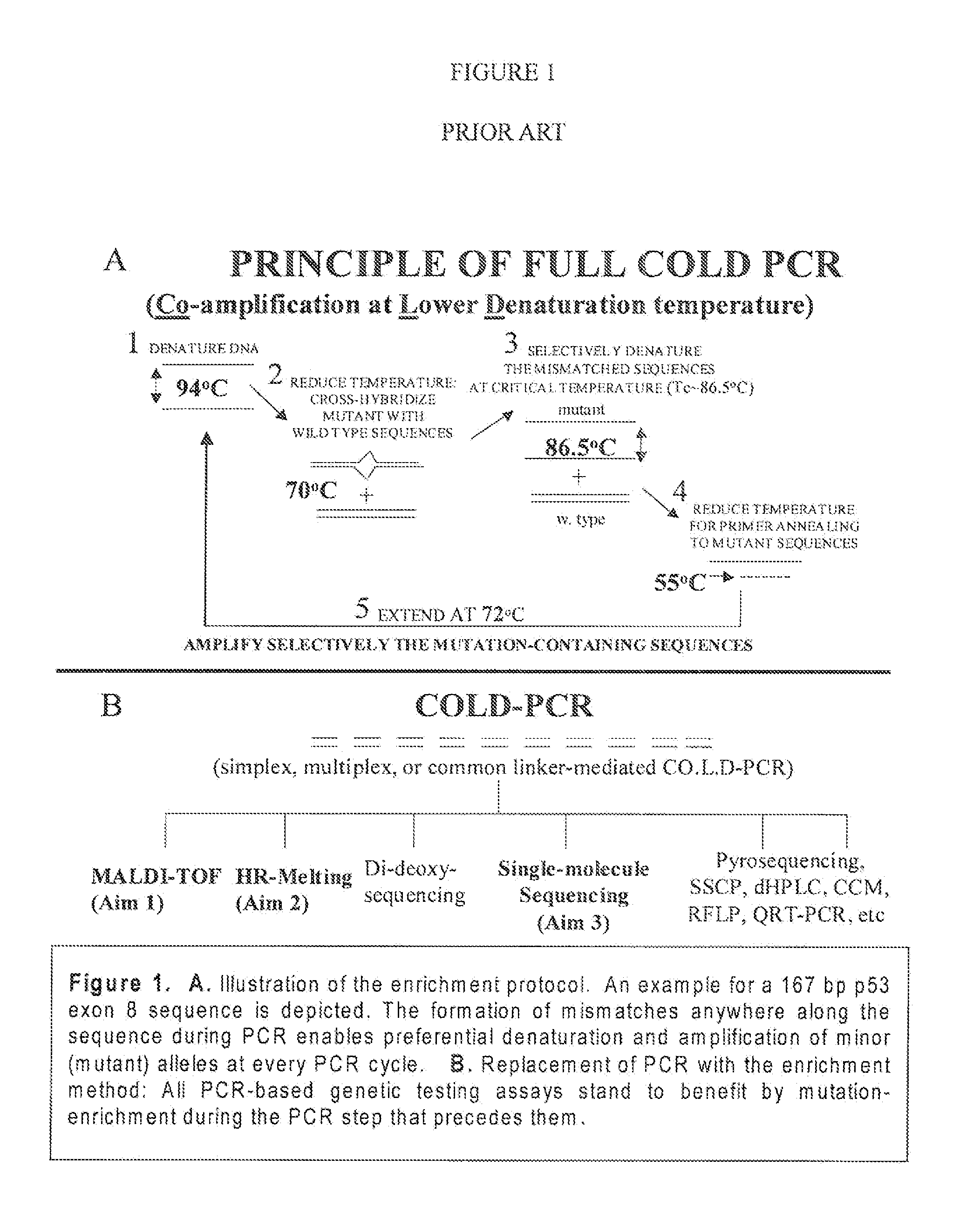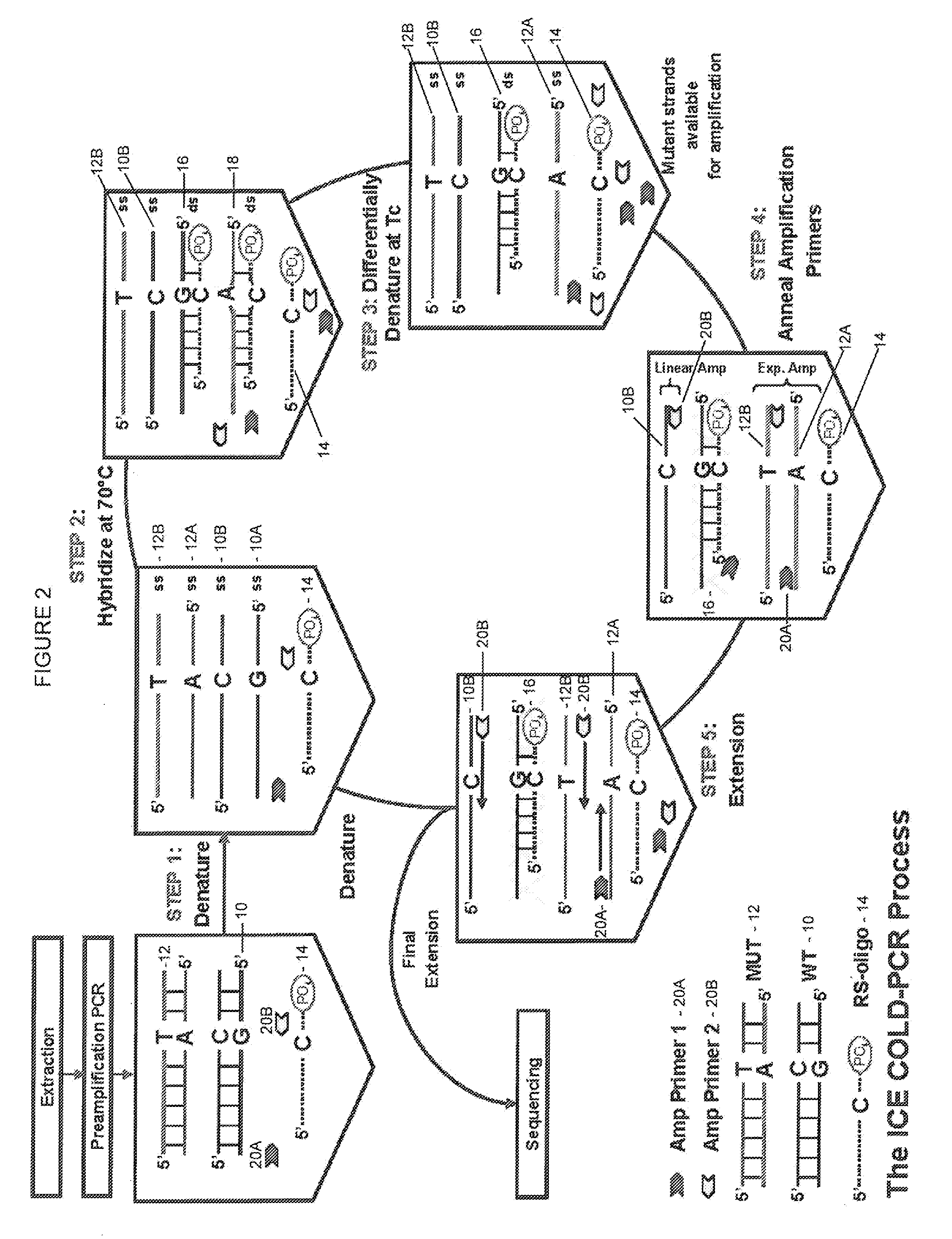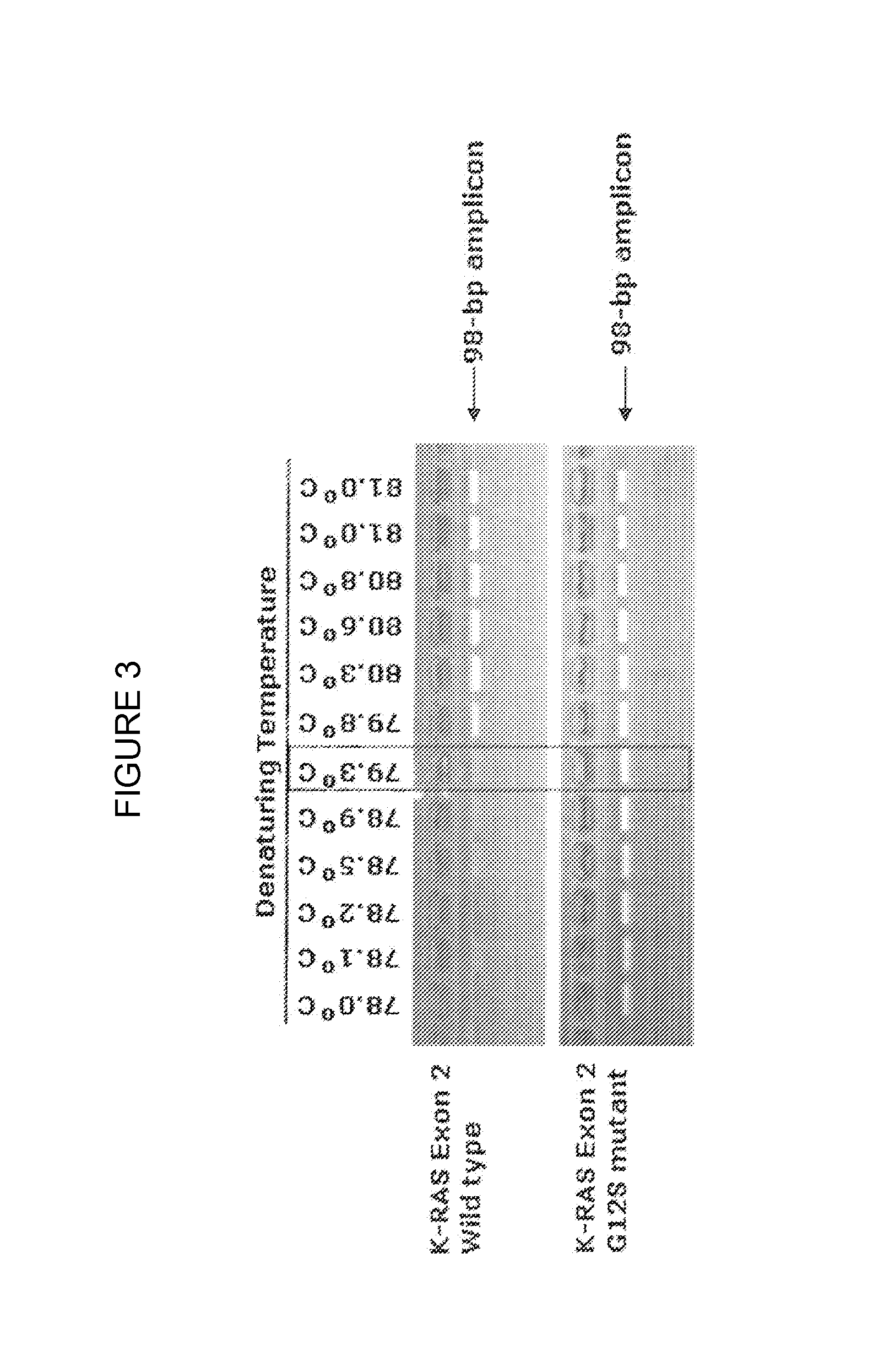Step-up method for cold-pcr enrichment
a step-up method and enrichment technology, applied in the field of step-up methods for coldpcr enrichment, can solve the problems of limited use of coldpcr and proved to be somewhat inefficient, and achieve the effects of minimizing well-to-well variation, precise temperature control, and minimizing well-to-well variation
- Summary
- Abstract
- Description
- Claims
- Application Information
AI Technical Summary
Benefits of technology
Problems solved by technology
Method used
Image
Examples
example 1
FAST COLD PCR for Determination of Presence of KRAS Exon 2 G12S Mutation
[0103]The first step was to determine the Critical Temperature (Tc) needed to enrich a KRAS Exon 2 G12S 98-bp amplicon. The results of this empirical determination of the Tc are shown in FIG. 3. The PCR was carried out with Taq DNA polymerase, Forward primer 5′ACTTGTGGTAGTTGGAGCT3′ (SEQ ID NO: 1) and reverse primer 5′CCTCTATTGTTGGATCATATT3′ (SEQ ID NO: 2). PCR amplification was carried out in an MJ Gradient thermocycler and consisted of an initial denaturation at 95° C. for 2 minutes, followed by 15 cycles of standard amplification at 95° C. for 15 seconds, 55° C. for 30 seconds and 72° C. for 30 seconds. The initial PCR was followed by 30 cycles of COLD PCR amplification with denaturation at temperatures between 78.0° C. and 81.0° C. as shown in FIG. 3 for 10 seconds, annealing at 55° C. for 30 seconds and extension at 72° C. for 30 seconds. The empirical Tc is shown in a rectangle as 79.3° C. in FIG. 3.
[0104]F...
example 2
FAST COLD PCR for Determination of Presence of KRAS Exon 2 G12D Mutation
[0105]Similar experiments using the primers described in Example 1 were performed to enrich a KRAS Exon 2 G12D amplicon in different thermal cyclers using either 8-tube strips or 96 well plates for the amplification reaction mixtures. As shown in FIG. 6, 1% KRAS Exon 2 mutant G12D was enriched in 8-tube strips in an MJ Research PTC-200 thermal cycler. The left panel of FIG. 6 shows the Step-up Fast COLD PCR protocol used for mutant enrichment and the right panel shows the fold-enrichment of the mutant molecules in the Calculated versus Block Mode in two different columns of the thermal cycler. The use of the block mode in combination with the step-up process allows for greater enrichment of the target sequence.
[0106]FIG. 7 shows the fold enrichment achieved by Step-up Fast COLD PCR of 1% KRAS Exon 2 mutant G12D in 8-tubes strips. MJ Research PTC-200 thermal cyclers (TC4 and TC5 in the table) with 48-well heads (...
example 3
FAST COLD PCR for Determination of Presence of EGFR Exon 20 T790M Mutation
[0108]A FAST COLD PCR method for the EGFR Exon 20 T790M mutation was previously developed. The primers for use in the reaction are as follows: Forward Primer: 5′-CTCACCTCCACCGTGCAACTCATC-3′ (SEQ ID NO: 3); Reverse Primer: 5′-TGGCTCCTTATCTCCCCTCC-3′ (SEQ ID NO: 4). In FIG. 9, Fast COLD PCR protocols at a fixed denaturation temperature (Td) are shown on the left and a Step-up Fast COLD PCR protocol is on the right. Fixed temperature protocols were carried out in the thermocycler Calculated Mode, while the Step-up Fast COLD PCR protocol was carried out in the Block Mode. The Tc for EGFR Exon 20 under the experimental conditions used was 85.6° C.
[0109]FIG. 10 is a summary of results obtained in an MJR thermocycler comparing enrichment of samples with different mutation load (mutation load in the initial samples is shown in the third column) of EGFR Exon 20 T790M by Step-up Fast COLD PCR and Fast COLD PCR at a fixe...
PUM
| Property | Measurement | Unit |
|---|---|---|
| melting temperature | aaaaa | aaaaa |
| denaturing temperature | aaaaa | aaaaa |
| temperature | aaaaa | aaaaa |
Abstract
Description
Claims
Application Information
 Login to View More
Login to View More - R&D
- Intellectual Property
- Life Sciences
- Materials
- Tech Scout
- Unparalleled Data Quality
- Higher Quality Content
- 60% Fewer Hallucinations
Browse by: Latest US Patents, China's latest patents, Technical Efficacy Thesaurus, Application Domain, Technology Topic, Popular Technical Reports.
© 2025 PatSnap. All rights reserved.Legal|Privacy policy|Modern Slavery Act Transparency Statement|Sitemap|About US| Contact US: help@patsnap.com



